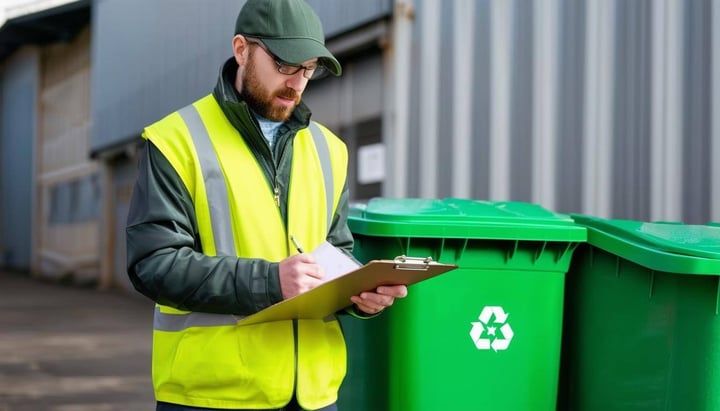A Practical Approach to Streamlining Waste Management for Your Facility
Managing waste and hazardous waste effectively is one of the most impactful ways a business can contribute to environmental sustainability while staying compliant with regulations. Waste management often flies under the radar until an issue arises—whether that’s a regulatory fine, escalating costs, or negative attention from customers or the community. By taking a proactive approach, businesses can avoid these pitfalls while also uncovering opportunities for operational improvements and cost savings.
Understanding and streamlining your waste management process doesn’t have to be overwhelming. The key is to start with the basics: what you produce, how it’s handled, and where it ends up. With a clearer understanding of your waste streams, you can implement practical steps to improve efficiency, reduce risks, and ensure compliance.
If you’re looking for actionable guidance, you’re in the right place. This blog outlines five straightforward steps to help you elevate your waste management practices. And hey, if it still all feels a little much for you, we can help. Reach out to talk to a waste management expert for professional guidance. With that - let's jump in!
1. Understand the Types of Waste Your Business Produces
The foundation of effective waste management is knowing exactly what types of waste your business generates. Waste typically falls into categories like solid waste, hazardous waste, universal waste, and recyclables, each of which has unique handling, storage, and disposal requirements. For example, hazardous waste must follow strict protocols under RCRA, while recyclable materials often involve different processes entirely.
Conducting a waste audit is a great way to get started. This process involves analyzing your facility's operations to identify every type of waste produced. It’s not just about compliance—it’s also about spotting opportunities to reduce waste or improve recycling rates. The more you know about your waste, the easier it is to manage it effectively.
Pro Tip: Don’t overlook smaller waste streams or materials that may fall into multiple categories. For instance, electronic waste might contain hazardous components but also have recyclable elements.
2. Identify and Document Your Waste Streams
Once you know what types of waste you generate, the next step is to map out your waste streams. This involves tracking the journey of waste from the moment it’s produced to its final disposal or recycling destination. Clear documentation isn’t just a good practice—it’s often a legal requirement.
For facilities subject to EPCRA, Tier II and TRI reporting are critical parts of this step. Accurate documentation ensures you’re prepared for these annual submissions and helps prevent errors that could lead to fines or penalties. A well-documented waste stream also helps you identify inefficiencies and areas where you can reduce waste or improve recycling practices.
Pro Tip: Use a centralized tracking system, such as a digital waste management log, to simplify documentation and ensure consistency across departments.

3. Be Diligent About Labeling and Sorting
Improper labeling and sorting of waste can lead to significant issues, including contamination, safety hazards, and regulatory violations. Correctly labeled containers ensure that hazardous waste, recyclables, and general waste are all handled appropriately, reducing risks and ensuring compliance.
Investing in proper training for your staff is critical here. Everyone involved in handling or disposing of waste should understand your facility’s labeling and sorting procedures. This not only ensures compliance but also reduces the likelihood of costly mistakes.
Pro Tip: Consider color-coded labels or signage to make sorting easier and more intuitive for your team.
4. Understand Regular Reporting Requirements
Compliance with reporting requirements is a non-negotiable aspect of waste management for applicable businesses. EPCRA’s Tier II and TRI reports are just two examples of mandatory submissions that some businesses must prepare each year. These reports demonstrate your commitment to transparency and help regulators monitor environmental impacts.
Missing a reporting deadline or submitting inaccurate information can result in fines or other penalties, so it’s essential to stay on top of your obligations. Create a compliance calendar to track deadlines and ensure that all necessary data is collected throughout the year. Partnering with a consultant can also help to determine if you need to engage in regular reporting - and to ensure accuracy and completeness in your reports if so.
Pro Tip: Review your previous year’s reports as a benchmark to identify trends and make adjustments to your waste management processes.

5. Assess Effectiveness and Look for Improvements
Waste management is an ongoing process, not a one-time task. Regularly assessing your practices allows you to identify areas for improvement and ensure that your efforts remain effective. This might involve increasing recycling rates, reducing hazardous waste output, or finding ways to reuse materials within your operations.
Taking a “cradle-to-grave” approach is especially helpful here. This means looking at the entire lifecycle of waste, from its creation to its final disposal, and making adjustments to reduce environmental impact. By continuously improving your processes, you can save money, reduce risks, and enhance your business’s reputation as a responsible operator.
Pro Tip: Schedule regular waste audits to evaluate your progress and uncover new opportunities for improvement.
Why Waste Management Matters More Than Ever
In today’s regulatory and social environment, waste management is about more than just compliance. It’s a reflection of your business’s values and a way to build trust with customers, employees, and the community. Proper waste management reduces risks, lowers costs, and helps create a more sustainable future.
Here at RMA, we specialize in simplifying waste management for businesses like yours. From waste audits and compliance reporting to training and ongoing support, we’re here to help you navigate every step of the process. Whether you’re just starting or looking to refine your existing practices, our team has the expertise to make waste management easier and more effective.
Ready to improve your waste management program? Contact us today to learn more about our services or schedule a consultation. Let’s work together to build a cleaner, greener, and more compliant future for your business!



